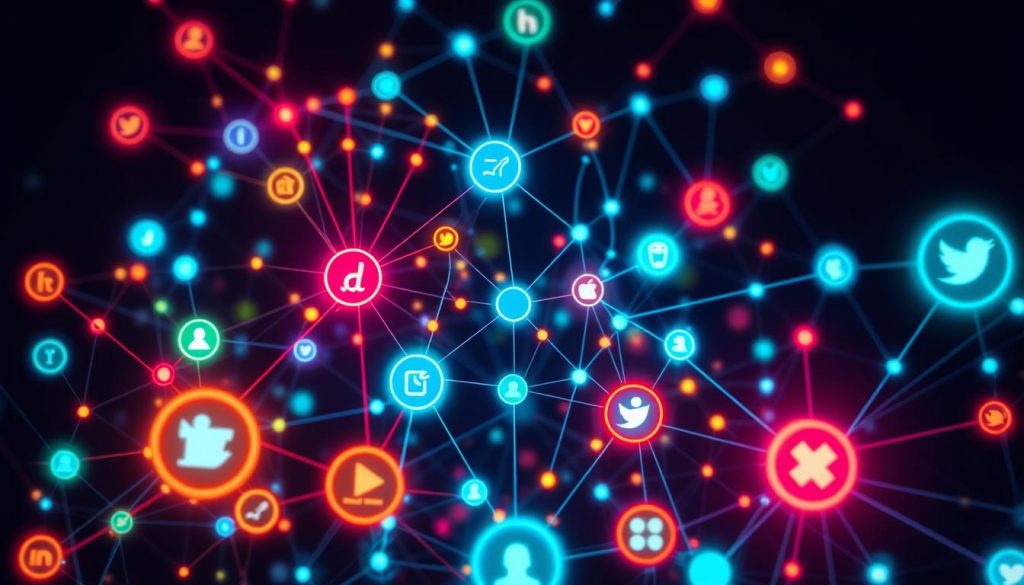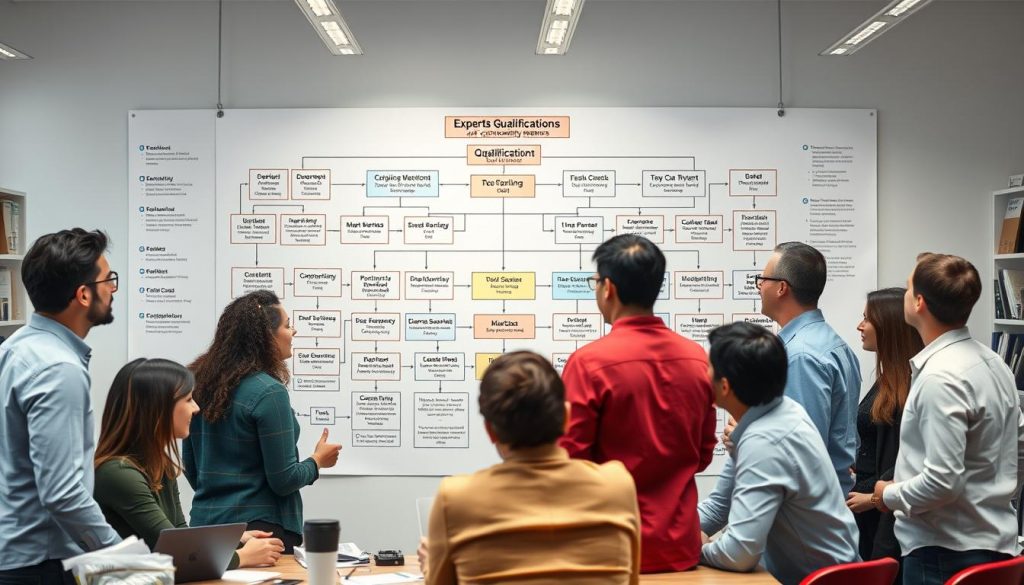The “false expert” phenomenon and its influence on collective behavior.
A study by Gisiela Klein found that information disorder can cause bad decisions. It makes opinions weak and debates in public spaces shaky. This is often because of false experts and misinformation.
Anúncios
More than half of DNA exoneration cases were based on lies or false accusations. This shows how false statements harm the justice system. It leads to information disorder.
The false experts phenomenon is when people think someone is an expert when they’re not. This spreads wrong information and damages trust in real sources. It’s a big part of information disorder and a major problem in our society.
Understanding the False Experts Phenomenon
Today, social media is a big problem because it lets false expertise spread fast. A study by Emilio Ferrara found that social media can spread lies and make false experts seem real. This is bad for democracy. Also, 70% of fake news before the election came from just 15 Twitter users out of 22,000.
Anúncios
People who think they know a lot are more likely to spread false information. This is called “overclaiming.” It’s dangerous in areas like finance or medicine because they don’t know what they don’t know. For example, a study with 100 people showed that those who thought they knew a lot about money were more likely to say they knew about fake finance terms.
To fight misinformation, we need to think critically and know how to use media. We should check facts with trusted sources and be careful of things that seem too good or bad. By doing this, we can lessen the harm of false information and make better choices together.
Here are some ways to improve critical thinking and media literacy:
- Verifying information through reputable sources
- Being cautious of information that seems too good (or bad) to be true
- Encouraging critical thinking and media literacy education
- Supporting fact-checking initiatives and independent media outlets
The Psychology Behind False Authority
The Dunning-Kruger effect is a key factor in spreading false information. It makes people think they know more than they really do. This can lead to trusting those who are not experts.
Studies in psychology show this effect can damage trust in real information. Here are some important points to consider:
- Those with less science knowledge and education are more likely to believe fake news.
- Being in echo chambers can make people more likely to believe misinformation than true reports.
- Misinformation has big effects on current events, like elections and the COVID-19 pandemic.
It’s important to understand the psychology of false authority to fight misinformation. By knowing about the Dunning-Kruger effect, we can work on stopping it.
| Factor | Impact on Misinformation |
|---|---|
| Low science knowledge | Increased susceptibility to fake news |
| Echo chambers | Selective exposure to misinformation |
| Dunning-Kruger effect | Overestimation of one’s abilities and knowledge |
How Social Media Amplifies False Expertise
Social media algorithms help spread false expertise by creating echo chambers. These chambers make people believe more in what they already think. A study by Emilio Ferrara found that algorithms can make misinformation spread fast.
The echo chamber effect makes people more likely to believe and share content that matches their views. Social media sites like Facebook and Twitter show users content that fits their beliefs. This can lead to the spread of false information, especially during big events like the COVID-19 pandemic.
Several factors help spread misinformation on social media, including:
- Partisanship
- Identity
- Confirmation bias
Media literacy and fact-checking can help fight false expertise. Experts say these methods are effective if used widely.

Experts want more data from around the world to understand misinformation better. By knowing what spreads false information, we can fight it and share real facts.
| Factor | Description |
|---|---|
| Partisanship | The tendency to believe and share information that aligns with one’s political beliefs |
| Identity | The tendency to believe and share information that aligns with one’s social identity |
| Confirmation bias | The tendency to seek and believe information that confirms one’s existing beliefs |
Common Tactics Used by False Experts
False experts often use manipulation and deception to spread their messages. A study by Gisiela Klein found these tactics are very effective in spreading false information. It’s crucial to know how false experts use manipulation and deception.
Some common tactics include:
- Impersonation: pretending to be an expert in a particular field
- Conspiracy theories: spreading false information to create confusion and mistrust
- Emotional manipulation: using emotions to influence people’s opinions and decisions
- Discrediting: attacking the credibility of real experts to gain an advantage
To learn more about controlling misinformation, visit controlling misinformation. Discover how deception and manipulation affect public behaviors and beliefs.
Knowing these tactics helps us protect ourselves from false experts. Their use of manipulation and deception can be harmful.
Impact on Decision Making and Public Opinion
A study by Emilio Ferrara shows that critical thinking is key to fighting false expertise in decision making and public opinion. It’s important to think critically to make good choices. In today’s world, where fake news spreads fast, we need to learn to think critically.
Being able to look at information objectively is a big part of critical thinking. This skill helps us trust real information more. By teaching critical thinking, we help people make smart choices. This leads to better public opinion and more active citizens.
- Encouraging media literacy and critical evaluation of information sources
- Developing analytical thinking skills through education and training
- Promoting a culture of skepticism and open-mindedness
By using these methods, we can create a society that thinks critically. This will help us deal with the challenges of decision making and public opinion in the digital age.
Detecting and Evaluating Expert Credibility
A study by Gisiela Klein shows that media literacy is key to spotting and judging expert credibility. It’s about carefully looking at experts’ qualifications, experience, and any biases they might have. Knowing who to trust is vital in areas like law, medicine, and science, where experts’ opinions shape big decisions.
To judge an expert’s trustworthiness, we need to look at their education, training, and field experience. It’s also important to check their past accuracy and any possible biases. Learning to think critically and understand media literacy helps us make better choices based on expert advice.
When checking an expert’s credibility, consider these points:
- Qualifications and experience in their field
- Track record of accuracy and reliability
- Potential biases and conflicts of interest
- Peer review and recognition within their field

By looking at these factors and improving media literacy, we can better understand who to trust. In today’s world, where expert opinions matter a lot, being able to evaluate them well is crucial.
| Factor | Importance |
|---|---|
| Qualifications and experience | High |
| Track record of accuracy | High |
| Potential biases and conflicts of interest | Medium |
| Peer review and recognition | Medium |
The Role of Critical Thinking in Combating False Expertise
Critical thinking is key in fighting false expertise and making smart choices. A study by Emilio Ferrara shows it’s vital for spotting and lessening false expertise’s effects. With so much info online, learning to think critically is more crucial than ever.
Some important ways to boost critical thinking include:
- Encouraging skepticism and questioning of information
- Developing media literacy skills to evaluate sources and identify biases
- Fostering a culture of open-mindedness and intellectual curiosity
By honing these skills, people can make better choices and fight off false expertise’s sway. Experts agree critical thinking is vital for spotting fake news and making informed decisions.
Also, schools can help by adding info literacy classes. This helps people spot reliable info and make smart choices. By teaching critical thinking and media literacy, we can make a more aware public. They’ll be better at handling the digital world’s challenges.
| Strategy | Benefits |
|---|---|
| Critical thinking | Promotes informed decision making, reduces influence of false expertise |
| Media literacy | Enables evaluation of sources, identification of biases |
| Open-mindedness | Fosters intellectual curiosity, encourages skepticism |
Building Resilience Against False Expert Claims
Building resilience against false expert claims needs a mix of expertise and critical thinking. A study by Gisiela Klein found that those with high expertise and critical thinking skills can spot and resist false claims better. They can better evaluate information and make informed choices.
To grow resilience, it’s key to boost media literacy and critical thinking. This can happen through education and training that focus on these skills. Also, people should check information and look at the credibility of sources before accepting it as true.
Some ways to build resilience include:
* Critically evaluating information
* Verifying sources
* Looking for diverse views
* Being careful of info that fits our biases
By becoming resilient against false expert claims, people can make better choices and stop misinformation. This is crucial for a healthy society where people can trust the info they get. They can make decisions based on facts, not lies.
| Strategy | Effectiveness |
|---|---|
| Evaluating information critically | High |
| Verifying sources | High |
| Seeking out diverse perspectives | Moderate |
| Being cautious of information that confirms pre-existing biases | Moderate |
Conclusion: Moving Forward with Informed Skepticism
In today’s world, it’s key to be skeptical. The rise of “false experts” can mislead us. This article showed how misinformation and unqualified voices affect our choices and society’s health.
But, we can fight back. By valuing expertise, critical thinking, and informed skepticism, we can resist false claims. We should always question information, check sources, and look into who’s speaking.
Let’s work towards a society that values real knowledge. We need to encourage critical thinking and open discussions. This way, we can build a society that makes smart choices and faces the world’s challenges head-on.
